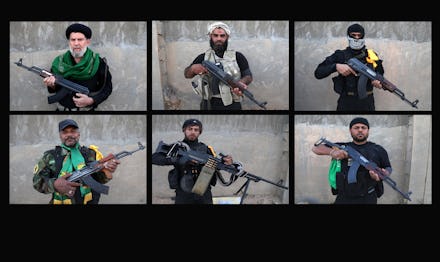Why Did the US Fail to Publish These Reports of Torture by Iraqi Militia?

In 2005, a 20-year-old Sunni law student told the Washington Post of his experience being beaten, hung from the ceiling and dunked in ice cold water with electrical currents.
He was one of 168 prisoners held captive in a secret Baghdad prison run by Shia Iraqi militia. He was released after the prison was discovered and dissolved by the United States Armed Forces, which by that point had been occupying Iraq for two years.
Both the U.S. and Iraqi governments launched their own investigations into how and why this secret prison — rife with human rights abuses — was being allowed to run. But the Iraqi "probe [was] derided by some of its own committee members at the time as a whitewash," Reuters, who reviewed both reports, explains.
What's more is neither report was ever published. And the entire affair has been glaringly underreported.
Why did nobody put a stop this? Chiefly, a centralized Shia militia does not exist, making them an intractable group to deal with.
"It's too complicated to describe it as one Shia militia — there are so many factions," Anthony Cordesman, a national security analyst with the Center for Strategic and International Studies, a public policy think-tank in Washington, D.C., told Mic.
Another part of the problem is the relationship between these militia and the Iraqi government. The secret prison was just one component in a convoluted network of of violence run by an "unofficial Interior Ministry organization called the Special Investigations Directorate," Reuters reports.
"We've sometimes tried to support the moderate [Shiite militia]," Cordesman said. "They've had considerable influence in the fight against ISIS, but they've alienated the Sunnis in the process. They've simply created as much of a problem as they've resolved."
In a 2014 Amnesty International investigated this issue, and detailed its findings in a report titled "Absolute Impunity: Militia Rule in Iraq."
"In recent months, Shia militias have been abducting and killing Sunni civilian men in Baghdad and around the country," stated the report. "These militias, often armed and backed by the government of Iraq, continue to operate with varying degrees of cooperation from government forces — ranging from tacit consent to coordinated, or even joint, operations."
Why would the U.S. withhold these findings? The benefits to the U.S. are arguably two-fold. Initially, when news of the secret prison broke, the Iraqi government was far from stable. America had handed off sovereignty to an Iraqi interim government the year before and only 10 months later, the government transitioned again in the middle of intensifying violence.
Exposing the Iraqi government as complicit in human rights abuses and aiding a rogue militia could have shattered its foundation before the glue was even dry.